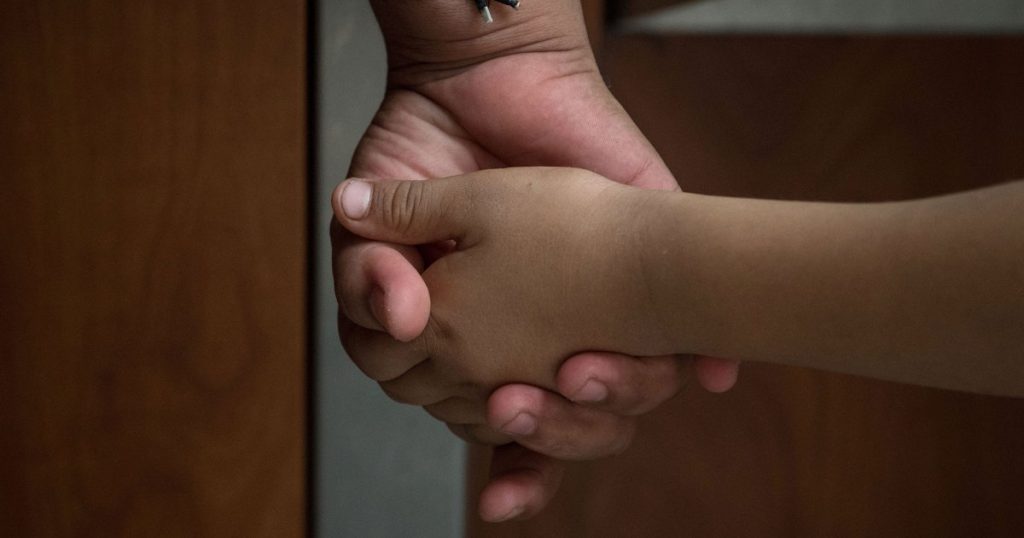Two Controversial Detention Centers Will Reportedly Stop Holding Families Long Term
A Honduran asylum seeker, recently released from federal detention, holds the hand of her six-year-old daughter at a bus depot in McAllen, Texas.LOREN ELLIOTT/AFP via Getty
Let our journalists help you make sense of the noise: Subscribe to the Mother Jones Daily newsletter and get a recap of news that matters.In a significant change to family detention policy, US Immigration and Customs Enforcement will no longer hold migrant families at two South Texas facilities and instead use the sites as short-term “reception centers,” according to the San Antonio Express News’ Jason Buch.
The newspaper broke the story Thursday afternoon, saying ICE will now hold asylum-seeking families at the controversial facilities in Dilley and Karnes City “only long enough to administer COVID-19 tests and health screenings and to arrange for shelter and transportation.” (As of publication, ICE had not responded to a request for comment from Mother Jones about the changes.)
Perhaps the most significant shift is that government officials will no longer conduct asylum credible fear interviews inside the facilities, which is one of the reasons families were often detained for long periods of time, according to the the San Antonio Express News. As the story explains:
Officials didn’t say exactly when the process will begin or how long it will take to release families, said Griselda Barrera, the San Antonio office director for American Gateways, which provides legal orientation to families in the 830-bed Karnes County Family Residential Center.
“The facilities are still going to be open,” Barrera said. “They’re still going to be holding the families. The difference between the process in the past is that families are going to be released faster, and the priority will be to release the families and not detain them.”
An ICE spokeswoman wouldn’t confirm the details relayed by those on the call but said Thursday that there were 65 people in the Karnes City facility and 382 at the South Texas Family Residential Center in Dilley. Together, the two facilities can hold around 3,200 immigrants.
Most stay there between 12 and 19 days, the spokeswoman said. Most recently, the Karnes County center was holding families that were going to be expelled from the country without being allowed to make asylum claims under COVID-19 protocols. In contrast, some of those who until recently were held in Dilley had been there for more than a year as they appealed deportation orders.
Advocates have been pushing for an end to family detention centers at Dilley and Karnes, as well as another in Pennsylvania at Berks, for years. Family detention was expanded under the Obama-Biden administration in 2014 in response to an increase of Central American families seeking asylum at the border. Detaining families in prison-like facilities was intended to deter more from coming to the border.
The pressure campaign to close the centers has only grown since the pandemic began last year. The three sites—the only ones in the US detaining families—have reputations for keeping parents and children in unsafe and unsanitary conditions without proper medical care. Last March, three nonprofits that provide services to immigrant communities—Aldea, RAICES, and the Rapid Defense Network—filed a lawsuit on behalf of 37 families inside the three facilities asking for their immediate release as a result of the coronavirus pandemic.
The situation inside these detention centers got even worse last May, when ICE agents went to the facilities and presented parents with a horrifying question: Would you rather stay detained together or be separated from your children? In the latter scenario, kids would be released from ICE custody while their parents remained locked up in unsafe conditions during a pandemic. At the time 185 children were detained at the three facilities and some had been there for more than three months. (By law, children are not supposed to be detained for more than 20 days, but ICE has continuously kept families detained for much longer—even those with very young children.)
This new move is just one of many actions the Biden administration has taken in his first month in office. Though, as I wrote earlier this week, Trump left Biden with a tight knot of immigration policy that will take some time to untangle.
While Thursday’s news signals a big change, the reaction from advocates, immigration lawyers, and nonprofits that work with these families was still mixed. Many agree this change is a good thing and the less amount of time children are detained the better. But, they warned, in the end, families are still being held in a prison-like environment, and the facilities aren’t shutting down.
Bridget Cambria, ALDEA’s executive director, hopes this is just a first step of many: “I will tell you that amongst us on the ground, there’s nothing better than after four years of constant battles to get an email with some good news.” Still, family detention shouldn’t exist, she said, and there remains the question of what will happen at Berks. There are 30 people, around 8 or 10 families, currently detained at the Pennsylvania site, she said.
In the short term, Cambria and other advocates will be watching to see if ICE actually moves quick enough during the screening process to ensure that children and their families are detained for the shortest amount of time possible. “Can that be done timely and efficiently? Of course it can, and I hope that they do,” Cambria said. “I guarantee you that RAICES and Proyecto Dilley and everyone here will make sure that happens.”





